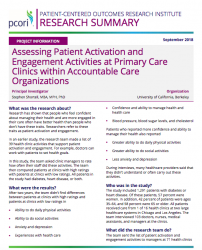You are looking at an archived version of our site. Please visit thepcc.org for a fresh, new experience!
You are here: Array » Assessing Patient Acti ...
Assessing Patient Activation and Engagement Activities at Primary Care Clinics within Accountable Care Organizations

What was the research about?
Research has shown that people who feel confident about managing their health and are more engaged in their care often have better health than people who don’t have these traits. Researchers refer to these traits as patient activation and engagement.
In an earlier study, the research team made a list of 39 health clinic activities that support patient activation and engagement. For example, doctors can work with patients to set health goals.
In this study, the team asked clinic managers to rate how often their staff did these activities. The team then compared patients at clinics with high ratings with patients at clinics with low ratings. All patients in the study had diabetes, heart disease, or both.
What were the results?
After two years, the team didn’t find differences between patients at clinics with high ratings and patients at clinics with low ratings in
- Ability to do daily physical activities
- Ability to do social activities
- Anxiety and depression
- Experiences with health care
- Confidence and ability to manage health and health care
- Blood pressure, blood sugar levels, and cholesterol
Patients who reported more confidence and ability to manage their health also reported
- Greater ability to do daily physical activities
- Greater ability to do social activities
- Less anxiety and depression
During interviews, many healthcare providers said that they didn’t understand or often carry out these activities.
Who was in the study?
The study included 1,291 patients with diabetes or heart disease. Of these patients, 57 percent were women. In addition, 42 percent of patients were ages 35–64, and 58 percent were 65 or older. All patients received care from 1 of 16 health clinics at two large healthcare systems in Chicago and Los Angeles. The team interviewed 103 doctors, nurses, medical assistants, and managers at the clinics.
What did the research team do?
The team sent the list of patient activation and engagement activities to managers at 71 health clinics in the two healthcare systems. The managers rated the extent to which their clinics did the activities. Then the team selected eight clinics with low scores and eight clinics with high scores for the study. Patients who received care at these clinics completed surveys. The team also looked at patients’ medical records. The team interviewed healthcare workers at the 16 clinics to ask about activities and challenges.
What were the limits of the study?
Health clinic managers may not have fully known the details of how their clinics carried out patient activation and engagement activities. So the high and low ratings may not have reflected actual clinic practices.
Future research could observe clinics directly to measure the activities.
How can people use the results?
Researchers can use the results to plan further studies to learn how patient activation and engagement activities at clinics affect patients’ health.
Menu secondario
Copyright © 2024 Primary Care Collaborative



